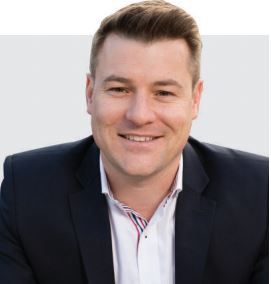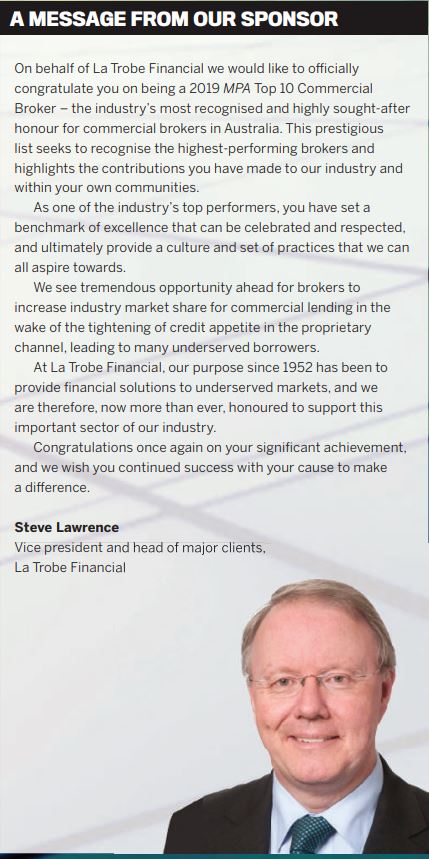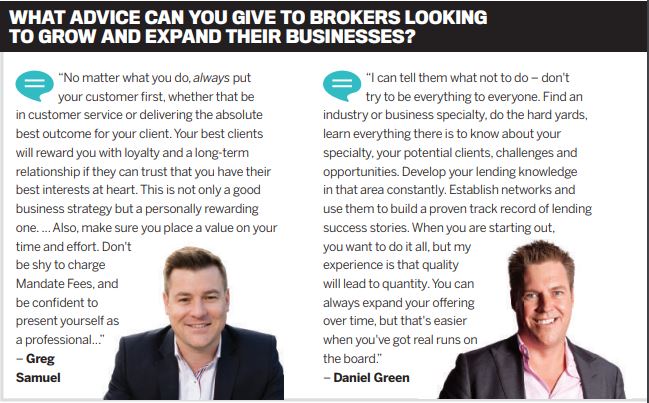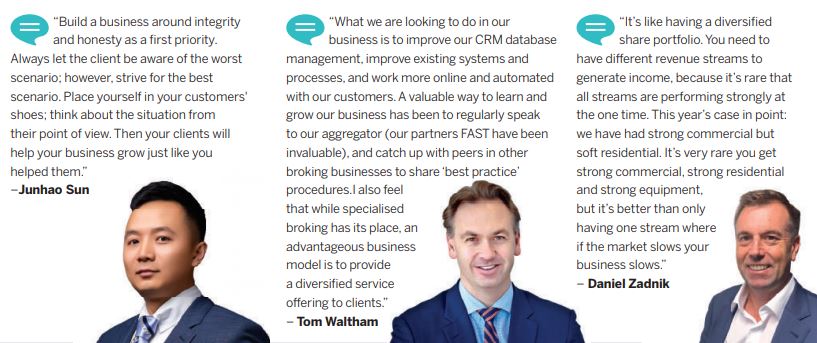See the brokers who overcame the challenges of the last year and came out on top

See the brokers who overcame the challenges of the last year and came out on top
The last 12 months have not been kind to the mortgage A MESSAGE FROM OUR SPONSOR broking industry.
With property prices falling, credit tightening and a series of horror stories coming out of the banking royal commission, residential lending figures have taken a hit.
Commercial brokers are experiencing similar scenarios but not as harsh.
The bigger banks are shifting their credit policies, and their lending appetite has changed, which also means brokers are facing longer turnaround times.
While some have found no real difference in the commercial lending space, others are taking a proactive approach to combat the slowing market.
This year’s Top 10 Commercial Brokers report not only celebrates those brokers who are continuing to grow under these di cult circumstances, but takes a deeper look at how they do so.
A number of our top commercial brokers are searching for alternatives to the big four to assist their clients, and others are even expanding to certain types of commercial finance that they know the banks are looking for.
The report also shows the vast difference between commercial brokers in terms of number and value of loans settled.
While one broker settled 15 loans, he was thousands of dollars above another who settled 36.
Our number one broker settled 23 loans, coming way above the broker who settled an impressive 127 deals. These figures demonstrate the huge numbers some of our brokers settled in single deals.
This year’s list includes commercial brokers dealing with huge infrastructure projects like shipping ports and hotel complexes, as well as shopping centres and development projects.
One notable takeaway from the report is that many of the commercial broking businesses in our top 10 are also offering a residential arm.
As one broker said, his commercial clients all have home loans too. Surveys like this one would not be possible if it weren’t for the support of brokers, aggregators and our sponsors.
We’d like to thank all the brokers who took the time to fill out our survey, regardless of whether you made the top 10, and those featured in this magazine for taking the time to talk about their businesses.
Cameron Perry
From his Melbourne office in the commonly dubbed ‘Paris’ end of town, Cameron Perry offers a broad range of commercial finance options.
The vast majority of deals are in development finance, but he also provides commercial real estate, equipment and asset
“Banks will probably stay fairly similar ... but I think there’s going to be quite a lot of activity in the non-bank sector”
Not content with just commercial, Perry Finance also offers residential mortgages.
“We do home loans; most of our clients have home loans as well and have equity in their property,” the father of two says.
The focus on property development has been there from the start of Perry’s broking 
The finance arm split off when the licensing changes came in during the GFC, and it grew from there.
Fast-forward to today and Perry says the last 12 to 18 months have seen another credit crunch scenario, and it’s becoming more and more difficult to meet the banks’ criteria.
“It’s become increasingly difficult for them to service loans once the client has two or three investment properties, just down to the changes that lenders have introduced,” he says.
After the GFC, Perry branched out into more private funding, which has helped him a lot in the past year.
Very few of his property development loans were written through banks, which means he also needs to educate clients on what the alternatives are.
“It’s a challenge because of the difference in pricing and the different ways that private lenders operate,” Perry says. Although he admits that he does not do a lot of them, he still uses the major banks in areas like small business loans, but he finds that he is turning more often to second-tier lenders for commercial investments.
To accommodate the changes to the lending environment, Perry’s business has had to focus on becoming more organised in its processes, which he says has not been a bad thing.
Looking ahead over the next 12 months, Perry thinks the tough lending market as it stands is “a new normal”.
He also expects this will increase the level of competition among lenders, which he hopes will bring about a larger benefit for his clients. “I think some of these other players coming into the market are currently quite expensive, but with the competition I think there’s going to be more reasonable price alternatives, so it’s quite an exciting space,” he says.
“Banks will probably stay fairly similar, that’s my feeling, but I think there’s going to be quite a lot of activity in the non-bank sector.”
Greg Samuel
Based out of South Australia, Greg Samuel began his journey as a commercial broker seven years ago after seeing a gap in the market.
Coming from 10 years in commercial and corporate banking, as well as in merchant banking overseas, he saw the need for good brokers who could prepare deals and present them in a fashion that banks could process easily.
Since then, the business has grown to four people, including a residential broker.
The majority of Samuel’s commercial deals over the past year have been in development finance; however, he has also 
“Presales have increased and LVRs have decreased, so that’s started to bring into play some of the second-tier development lenders”
Samuel comes from a fourth-generation farming family and has an interest in his family’s poultry farming business, which has given him a strong understanding of farm and agribusiness lending.
He says offering such a comprehensive suite of services is
“Offering the full suite is good for managing the cash fl ow of the business,” Samuel says.
“I tend to gauge the business performance on the home loan activity – that’s our bread and butter – and then the commercial stuff is the cream on the cake.” By diversifying he can help his customers in more than the one area they may have originally come to him for.
For example, he says: “I have a client that came to us for a $400,000 farming loan.
They wanted to buy an extra farming property. It seems like a lot of work for not very much, but when you do a bit more digging there’s probably about $600,000 or $700,000 worth of investment loans you can look at.
While they initially came to me for that loan, we’re going to put together a proposal to restructure all their finances, and we should be able to get a really good result for them.”
While the residential space has been noticeably affected by the property market and tightening credit, Samuel hasn’t had too many issues with commercial.
The biggest problem is when a residential loan is tied in with commercial lending, which for some lenders means greater scrutiny of the commercial transaction.
He has noticed a slight rise in clients turning to second-tier lenders in the past year, but he will always go to a major first for better pricing and terms.
He adds that “presales have increased and LVRs have decreased, so that’s started to bring into play some of the second-tier development lenders”.
Looking ahead, Samuel says he is “buoyed and optimistic” about his future business growth.
Larry Zhou
It was while he was working in the banking industry that Larry Zhou began to understand what customers really wanted from a bank but weren't getting: options, unbiased advice and longevity of relationship.

Based in Fairfield, Victoria, Zhou – who is married and a father, as well as an active tennis player – started out as a graduate banker in 2007 but broke away to set up his own business with the support of “a great family and close circle of friends”.
“I love working with entrepreneurs and admire the way they see the world; there’s a story behind every business and every project”
His broking business is modelled for property developers and high-net-worth commercial property investors.
The vast majority of his loans settled last year were for development finance in fact 
The rest were primarily commercial real estate deals, with a small percentage of equipment and asset finance deals thrown in for good luck.
Zhou says he never fi t into the culture at the bank and had no passion for it, but now as a commercial broker there is never a dull moment.
“I wanted to be in the business of helping other businesses grow,” he says.
“I love working with entrepreneurs and admire the way they see the world; there’s a story behind every business and every project.”
But over the past year Zhou has noticed a change in banks' lending appetites.
The majors are showing a strong preference for reserving lending capital for their existing and well-established customers.
However, he adds that even the banks seem a little confused about their own appetites.
“We hear a lot of ‘we’re open for new business’, but in reality new clients seeking funding face massive headwinds and scrutiny,” he says.
This added scrutiny has meant that Zhou is spending more time drafting submissions and providing more in-depth analysis.
With the bigger banks tightening, Zhou and his team are seeing more opportunities being passed to alternative lenders.
He says a lot of external capital seems to be coming into the Australian market, providing much-needed funding options.
This is where the commercial broker can add value.
Zhou says he is seeing a lot of restructuring within the banks, and “more than ever” he is hearing from customers that high turnover of bank staff is affecting their businesses.
More and more commercial clients are now open to speaking to commercial brokers, keen to understand what is available for them in the market.
“The key opportunity now is to establish solid relationships in times of uncertainty; there are examples of clients who we’ve been speaking to for years before we complete a transaction,” Zhou says.
Daniel Zadnik
Working out of Hawthorn, Victoria, Daniel Zadnik, managing director of Hawthorn Finance, offers a wide range of commercial finance: working capital, property finance, development funding, agricultural lending and asset finance.
A broker for the past 11 years, Zadnik spent nearly 20 years in corporate and business banking at ANZ before that.
He says this experience helped get him to where he is today. At ANZ he was also introduced to McLean Delmo, which led to the opportunity to become a shareholder in Hawthorn Finance.
Subsequently, McLean Delmo joined the Bentley’s national accounting group, which enabled the business to establish Bentley’s Finance.
“For good brokers this will create opportunities to work closely with both new and existing clients who will need guidance”
The dual brand has continued to grow over the past decade and now employs eight people.
Zadnik says this growth is built on clients' trust; they are able to have frank discussions with Hawthorn that they could not have with the banks.
Bentley’s Finance is opening a new rural office this month in Emerald, Central Queensland.
“People in these communities tend to embrace the local, more so than someone coming out of the city,” Zadnik says.
“They want someone that’s going to know their town and their business; they don’t want someone rocking up from the city in a suit telling them how to do things.”
While Hawthorn has seen growth, Zadnik has still faced challenges in the last year in the home loan space.
But strong commercial lending and asset finance have offset the business's lower residential volumes, he says.
Unlike some brokers, Zadnik continues to use the major banks because they are more cost-effective, with lower costs of funds than second-tier lenders and alternative providers.
“That said, we have certainly developed some good working relationships with some alternative lenders who we use when the metrics don’t tick all the boxes for the mainstream banks.”
Now that the royal commission report has been released, Zadnik expects its impact to continue for the foreseeable future, with lending and economic conditions remaining subdued for the next 12 to 18 months.
But he does think they will eventually improve.
“Once the dust settles after the election and the banks deal with the royal commission recommendations, they will then need to refocus their attention on growing their businesses again,” he says.
While lending remains down, however, Zadnik believes it's a good time for brokers.
“For good brokers this will create opportunities to work closely with both new and existing clients who will need guidance,” he says, adding that without diversifying his business to help his clients Hawthorn Finance would not be where it is today.
Tom Waltham
Another SA representative on this year’s list, Tom Waltham operates Capital United out of the Adelaide CBD.
The debt advisory and broking firm specialises in debt finance across a range of transaction types and sectors.

“Having strong relationships across a number of lenders … should allow brokers to value-add and meet clients’ needs in obtaining optimal loan terms”
He spent nearly five years at the major bank and ended up in a senior relationship manager role in business banking.
“I thoroughly enjoyed my time at NAB and learnt a lot about banking and finance,” he says.
“It was my time at NAB that opened my eyes to the opportunity in the third party space.”
Waltham’s interest in setting up a broking business was “piqued” in 2007 when he 
“Wind the clock forward to current day, and commercial volumes introduced to the major banks now account for circa 40% via third party, and residential volumes are circa 59% via third party, and growing,” he says.
Waltham says there is no doubt lending parameters have tightened and turnaround times have increased over the past 12 to 18 months as a result of the royal commission, but he still believes there has been no better time to be a broker.
“Having strong relationships across a number of lenders, as well as an in-depth knowledge of which lenders are funding certain transaction types, should allow brokers to value-add and meet their clients’ needs by obtaining optimal loan terms,” he explains.
Even in earlier years, Waltham knew how important it was to create and maintain relationships with multiple lenders. It was a “main focus” of his to do that, and his relationships extended across major banks, credit unions, second-tier lenders and private funders.
In 2018 the group settled deals across 10 lenders.
Going a step further, when the major banks began to restrict property lending after macroprudential reforms were introduced post-GFC, Waltham co-founded non-bank lender Keystone Capital in 2013.
It specialises in first mortgage property transactions and has seen significant growth in borrower and investor demand across Australia.
Waltham expects that while the second-tier and non-banks sector will continue to grow, the majors will look “aggressively” to retain existing clients that meet their lending parameters, and offer competitive terms to new clients that tick the right boxes.
Jason Arnold
A great example of growth through diversification is the managing director of Quattro Finance, Jason Arnold.
Up one place compared to 2017 and three places from 2016, he has increased his average loan size considerably to claim a higher total value.
Arnold runs his business out of Melbourne, and the majority of his lending is focused on development finance, commercial property finance and structured finance transactions.
But realising the need to offer a more comprehensive suite of funding options, Quattro has incorporated home loans over the past two years, which have seen year-on-year growth.
“Providing a variety of options to clients and reviewing each in detail assists us in our aim to deliver a great client outcome”
Not stopping there, the business is planning to add asset finance and small business lending within the next 12 to 18 months.
After 18 years in the industry, Arnold has built up great relationships with non-bank and private lenders, which have ensured minimal impact on his clients while the market has slowed.

Arnold's business has had to adapt to significant policy change in the home loan space.
But he says, “I’m fortunate that, coming from a commercial background and a strong understanding of complex corporate and finance structures, we have been able to adjust and educate our client base to ensure minimal impact on our home loans business.”
The major banks still play a vital part in Arnold's business, and he prides himself on offering a mix of banks, non-banks and private funders.
“We therefore have not had to shift too far away from those relationships,” he says.
“Providing a variety of options to clients and reviewing each in detail assists us in our aim to deliver a great client outcome.”
Arnold cannot see major banks widening their credit appetite in the near future, but he believes they are right for some transactions.
When they aren't, he urges caution with respect to some of the newer non-bank and private lending options.
“You do need to be careful to ensure they are a trustworthy source that ideally is fully funded and importantly can deliver.”
Having ensured his business is diversified and adaptable, Arnold says other brokers need to look to do the same but with the right level of training and support from aggregator and lending partners.
“Without the appropriate level of training, support and experience, the risk of a poor client outcome increases, and this needs to be avoided,” he says.
“As it stands, I believe the barrier to entry for the broking industry needs to be higher.”
Ben Wardley
A career in banking at two of the big four banks steered Ben Wardley, director of The Brokerage, towards commercial broking back in 2005.
Having dealt mostly with commercial real estate, it was his relationships with property developers and investors in those bank roles that encouraged him to focus mainly on construction.
The Brokerage services the east coast primarily, with Wardley based in Sydney and another office in Brisbane.
Even if the finance is not specific to construction, it's related, whether it's used to help purchase a site or involves releasing equity from other assets.
“We will welcome those new lenders because it makes our job a bit easier; there’s plenty of competition in that space”
The Brokerage also has big investor clients, such as shopping centres. Wardley's experience at the banks has helped him understand exactly what brokers need to present when applying for a loan.
He says he would have struggled without that knowledge.
Despite this, he has not been immune to the struggles of the past 12 months.
He says it feels like a “long marathon” to get deals approved and settled with the increasing scrutiny. In fact, he has had to pick his battles and change the types of transactions the business takes on.
“We have done a lot of apartments and highdensity unit blocks, and it’s been quite obvious for the last few years that banks are turning off the taps for that,” he says.
“We've done a lot more in the commercial construction space and a lot more shopping centres and warehouses.”
Wardley has turned more and more to non-bank and private lenders as a result of the tightening credit, which he says is a good thing because their processes are faster and they have flatter approval structures.
“That’s been a focus for the last 12 months for us to make sure we’re getting out there and looking under the rocks and making sure we’re aware of who’s doing the funding in this space,” Wardley says.
As part of this, he has to make sure his clients are kept up to date on market conditions and informed that they may need to pay higher fees to alternative lenders.
Looking ahead, Wardley wants to continue the push towards commercial transactions and help clients buy sites as they wait for conditions to improve.
To assist with that, the team set up a residential mortgage business to handle the residential deals.
In terms of the wider lending market, Wardley believes it will be “more of the same”, but he does think the non-banks will overtake the banks when it comes to customer choice.
“We always hear of new lenders entering that space,” he says.
“We will welcome those new lenders because it makes our job a bit easier; there’s plenty of competition.”
Junhao Sun
Now preparing to move to an even bigger office in Melbourne, Junhao Sun has made huge strides in growing his business in the four years since he became a commercial broker.
The father of two originally came to Australia as an overseas student and kicked off his finance career in 2008 at Westpac as a personal banker.
He moved through a number of roles, including residential lending manager, but in 2014 left the bank to think about opening his own broking business.
“In the bank I didn’t have too much room to grow, and I had ambitions to be managing myself,” he says.
“Since the lending policies and criteria have changed, we adapted ourselves to going back to the second-tier and third-tier lenders”
At the start of 2015, he began AUSUN Finance as the solo loan writer.
Fast-forward to today and he has 11 licensee holders and a team of 20 staff. Sun deals primarily in commercial 
His experience at the bank and of moving to Australia has given him an edge.
Around 90% of his clients are Asian, and the rest are generally made up of referrals from those clients.
“It’s helped me. Using my cultural background has lent me an advantage to gain the trust from Asian clients,” he says.
“If I was to place myself in their shoes, they’re coming to this country, they don’t know too much, and also language could be one of their barriers. Things are different in Australia and China, and I can highlight all the differences in a language easy for them.”
While Sun says he has noticed the market slowing down, it has affected the residential lending space more than the commercial side.
He expected a larger impact on his business, but it is still growing, just not at the pace it had been previously. One thing he has faced, however, is the need to change the lenders AUSUN uses.
He says he was well prepared for that shift. “We used to be dealing a lot with the major four,” he explains.
“Since the lending policies and criteria have changed, we've adapted ourselves to going back to the second-tier and third-tier lenders.”
Sun expects very few changes in the future, and even that lending will get tighter.
But he has a plan in place to ensure his business runs smoothly.
Ever since AUSUN’s first year in business – with just one or two brokers on board – he has been running weekly information sessions that keep brokers updated on policies and allow them to workshop deals with each other and share their experiences of particular lenders, saving other brokers time and their clients time. “It’s very important,” he says.
“The lending policies and the environment could be changing on a regular basis; we have to make sure we are always upfront.”
Daniel Green
Operating out of Queensland, the director of Green Finance Group is another returning Top 10 Commercial Broker.
Up from seventh place in last year's list, Green has seen a substantial increase in his average loan size.
The reason behind his success? Consistency, he says.
“I’d like to think I can help everyone who walks through the door, straight away, but we often find the timing just isn’t right. New business ideas or plans for expansion need time to form.”
“Some of the bigger banks have recently revived policy to reduce loan fees for small businesses, and additional credit availability is starting to filter through”
While Daniel Green’s lending experience crosses most industries – including childcare finance and commercial property and development finance – his personal specialty is pub and hotel finance.
After working in banks for well over a decade, Green established Green Finance Group in 2010, operating solo.
Since then he has expanded to a team of nine specialist finance brokers, a financial planner and three support staff.
The changes in the market have not gone unnoticed by Green.
Increased regulatory frameworks, mostly due to the royal commission, have resulted in extra documentation required and longer turnaround times.
Green says changing lender appetites and policy are “par for the course” and it’s his job to be across that no matter what, but the hardest part has not been the extra work for the banks.
“If anything I’ve had to work harder to educate my clients around timing and preparation and the fact that just because their existing bank worked in the past doesn’t mean they’ll be receptive now,” he explains.
Green has a panel of over 30 lenders, both banks and non-banks, to provide better options for his clients.
While other brokers have found bigger banks tightening up, in some areas he has seen the opposite. “Some of the bigger banks have recently revived policy to reduce loan fees for small businesses, and additional credit availability is starting to filter through,” he says.
Looking forward, Green expects lending to widen up again.
“It’s swings and roundabouts,” he says. In his own business he sees a big opportunity to grow through the strategic development of referral partnerships, particularly in the commercial property sector.
Referrals currently account for 70% of his business, either through existing clients or business associates like solicitors, accountants and real estate agents.
The client relationship for Green is important, and he believes in extending the broker value “beyond a simple transaction”.
“The customer has always been at the centre of my business philosophy,” he says. “Without them my business wouldn’t exist”.
Kevin Wheatley
This year’s top commercial broker is a well deserving winner, having made his way up the list over the years and jumped from third place last year.
Kevin Wheatley, director of Sydney-based Bayside Residential and Commercial Mortgages, is writing some big figures.
Originally a logistician working on projects like shipping port facilities, Wheatley found there was a high component of procurement in the industry and saw it as a natural step towards offering a finance service.
And “the rest is history”, he says. Still providing logistics support globally, Wheatley writes deals for hotel and residential construction and commercial funding, putting financial structures together and raising capital to ensure the structures are funded and completed.

“When you’re in this environment and institutions have tightened monetary policy … you have really got to apply yourself and look at where alternative funding streams can come from”
The move into finance is one of the best decisions he’s ever made, he says.
“I have never looked back, and I've managed to maintain the same work effervescence today as I did when I made the conscious decision to move across.”
Working with high-end clients has not meant Wheatley has escaped the challenges of the past 18 months.
He's seen a di cult finance environment. “Anyone that says it’s been easy really isn’t writing a lot of business,” he says.
“We’re working twice as hard as we have ever done, but that’s to be expected.”
But Wheatley says this is where a broker’s knowledge and background can earn the respect of clients who come to them for support.
“When you’re in this environment and institutions have tightened monetary policy, this is where you have really got to apply yourself and look at where alternative funding streams can come from.”
To do this, Wheatley has about 80 lenders on his panel made up of mainstream banks, non-banks, foreign investment banks, annuity funds and private funders.
Over the past six months, around 80% of his funds have come from private funding or non-banks.
Wheatley has not made the active decision to avoid major banks; in fact he says in the current environment brokers need to strengthen their relationships with the banks and work within their policies and guidelines.
“We can’t go beating up the banks because of the policy and regulation changes,” he says.
“If you can put a deal together with the mainstream bank, great.
But if they don’t have an appetite for the business we’re trying to introduce them to, then we have no option but to go to second-tier funders.”
Wheatley has also had huge success with o‑ shore business in Southeast Asia and the Middle East.
He uses offshore funders and annuity funds that have an appetite for big infrastructure programs like toll road centres, shopping centres and port facilities.
In terms of the Australian market, Wheatley is confident about its future and expects much more stability after the election dust settles.


.JPG)

.JPG)
.JPG)

.JPG)
.JPG)
.JPG)





